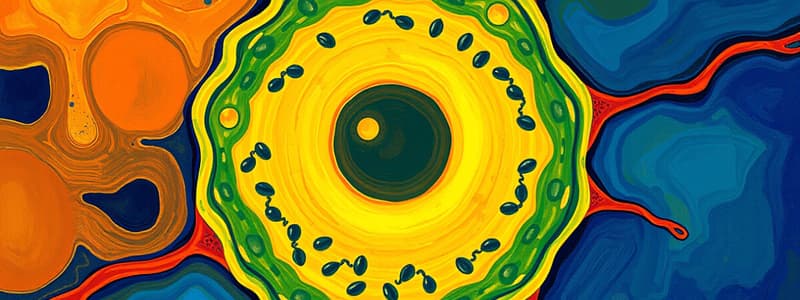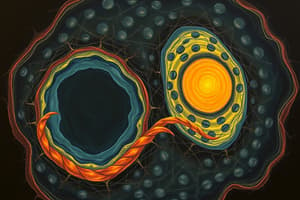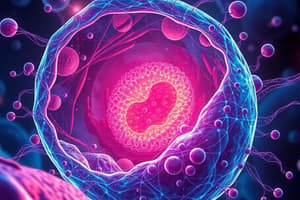Podcast
Questions and Answers
What is the primary role of the nucleus in a cell?
What is the primary role of the nucleus in a cell?
- Producing energy through cellular respiration
- Transporting materials within the cell
- Synthesizing proteins on ribosomes
- Storing and processing genetic information (correct)
Which component is NOT part of the endomembrane system?
Which component is NOT part of the endomembrane system?
- Nuclear envelope
- Mitochondria (correct)
- Lysosomes
- Golgi apparatus
What substance primarily makes up ribosomes?
What substance primarily makes up ribosomes?
- Lipids and carbohydrates
- Enzymes and substrates
- DNA and RNA
- rRNA and proteins (correct)
What function do nuclear pores serve?
What function do nuclear pores serve?
Which pathway generates energy without the use of oxygen?
Which pathway generates energy without the use of oxygen?
What role does the cytoskeleton serve in a cell?
What role does the cytoskeleton serve in a cell?
Which structure within the nucleus is responsible for producing ribosomes?
Which structure within the nucleus is responsible for producing ribosomes?
What is a distinguishing characteristic of polyribosomes?
What is a distinguishing characteristic of polyribosomes?
What is the primary reason cells are limited in size?
What is the primary reason cells are limited in size?
Which type of microscope has the capability to view live specimens?
Which type of microscope has the capability to view live specimens?
What relationship is observed in the surface-area-to-volume ratio as cell size increases?
What relationship is observed in the surface-area-to-volume ratio as cell size increases?
What is the primary function of the Rough Endoplasmic Reticulum (RER)?
What is the primary function of the Rough Endoplasmic Reticulum (RER)?
Which statement is true about cell theory?
Which statement is true about cell theory?
Which process involves the movement of water across a membrane?
Which process involves the movement of water across a membrane?
Which of the following best describes lysosomes?
Which of the following best describes lysosomes?
What component of the cytoskeleton is primarily responsible for maintaining cell shape?
What component of the cytoskeleton is primarily responsible for maintaining cell shape?
In terms of cell organelles, what is the role of the plasma membrane?
In terms of cell organelles, what is the role of the plasma membrane?
What process is actively involved in transporting large molecules into a cell?
What process is actively involved in transporting large molecules into a cell?
How do vesicles function in a cell?
How do vesicles function in a cell?
Which type of cell lacks a defined nucleus?
Which type of cell lacks a defined nucleus?
Which organelle is involved in processing, packaging, and secretion of vesicles?
Which organelle is involved in processing, packaging, and secretion of vesicles?
During cell division, which cytoskeletal component helps in moving chromosomes?
During cell division, which cytoskeletal component helps in moving chromosomes?
What types of materials do hydrolytic enzymes in lysosomes break down?
What types of materials do hydrolytic enzymes in lysosomes break down?
Which of the following functions does the smooth endoplasmic reticulum (SER) primarily perform?
Which of the following functions does the smooth endoplasmic reticulum (SER) primarily perform?
What type of microscopy uses a stream of electrons to view magnified images?
What type of microscopy uses a stream of electrons to view magnified images?
Which of the following is a characteristic of prokaryotic cells?
Which of the following is a characteristic of prokaryotic cells?
Which statement correctly describes the plasma membrane?
Which statement correctly describes the plasma membrane?
What is the primary purpose of the scanning electron microscope?
What is the primary purpose of the scanning electron microscope?
What role do organelles play within a cell?
What role do organelles play within a cell?
Which of the following is true regarding eukaryotic cells?
Which of the following is true regarding eukaryotic cells?
What is contained within the cytoplasm of a cell?
What is contained within the cytoplasm of a cell?
Which type of electron microscopy cannot view live specimens?
Which type of electron microscopy cannot view live specimens?
What is the primary function of endocytosis?
What is the primary function of endocytosis?
Which subtype of endocytosis specifically targets pathogens?
Which subtype of endocytosis specifically targets pathogens?
What process occurs when molecules are transported out of the cell?
What process occurs when molecules are transported out of the cell?
In receptor-mediated endocytosis, what initiates the process?
In receptor-mediated endocytosis, what initiates the process?
Which type of transport involves the fusion of a vesicle with the plasma membrane?
Which type of transport involves the fusion of a vesicle with the plasma membrane?
Flashcards are hidden until you start studying
Study Notes
Nucleus and Genetic Information
- The nucleus serves as the storage site for genetic information.
- Contains DNA in the form of chromatin and chromosomes during cell division.
- Housing nucleoplasm, the fluid within the nucleus, and nucleolus, which produces ribosomes.
- Nuclear envelope is a double membrane featuring nuclear pores for selective transport.
Endomembrane System
- Comprises the nuclear envelope, endoplasmic reticulum (ER), Golgi apparatus, lysosomes, and vesicles.
- Functions to compartmentalize the cell and facilitate transport of substances.
- Rough Endoplasmic Reticulum (RER) has ribosomes for protein synthesis; Smooth Endoplasmic Reticulum (SER) synthesizes lipids.
- The Golgi apparatus processes and packages proteins and lipids for export.
- Lysosomes contain hydrolytic enzymes crucial for breaking down substances, prominent in immune responses.
Cytoskeleton
- Provides structural support and maintains cell shape using a network of protein fibers.
- Comprises three types of fibers:
- Microtubules (largest), which aid in organelle movement and cell division.
- Intermediate filaments, essential for cell structural integrity.
- Actin filaments (thin), also involved in cell movement and division.
Cell Size Limitations
- Surface-area-to-volume ratio restricts cell size; smaller cells are more efficient in nutrient absorption and waste elimination.
- Increased surface area allows for enhanced transport of materials in and out of cells.
Microscopy in Cell Study
- Different microscopy techniques provide varying resolutions and magnifications:
- Compound Light Microscope: Lower magnification, suitable for live specimens.
- Transmission Electron Microscope: High magnification for 2-D images, no live specimens.
- Scanning Electron Microscope: Offers 3-D images of surfaces, high magnification, no live specimens.
Cell Organization
- Cells categorized into prokaryotes (lacking a nucleus, including bacteria) and eukaryotes (containing a nucleus, including animals, plants, fungi).
- Both cell types feature a plasma membrane and cytoplasm containing organelles with specialized functions.
Transport Mechanisms
- Diffusion and osmosis allow passive movement of molecules based on concentration gradients.
- Facilitated transport utilizes carrier proteins for molecule passage without energy expenditure.
- Active transport requires energy to move substances against concentration gradients, illustrated by the sodium-potassium pump.
- Endocytosis involves movement of materials into the cell; types include:
- Phagocytosis: Engulfing pathogens.
- Pinocytosis: Absorption of fluids.
- Receptor-mediated: Selective uptake of molecules.
Exocytosis
- Exocytosis is the process through which cells expel materials by fusing vesicles with the plasma membrane, essentially reversing endocytosis.
Studying That Suits You
Use AI to generate personalized quizzes and flashcards to suit your learning preferences.




